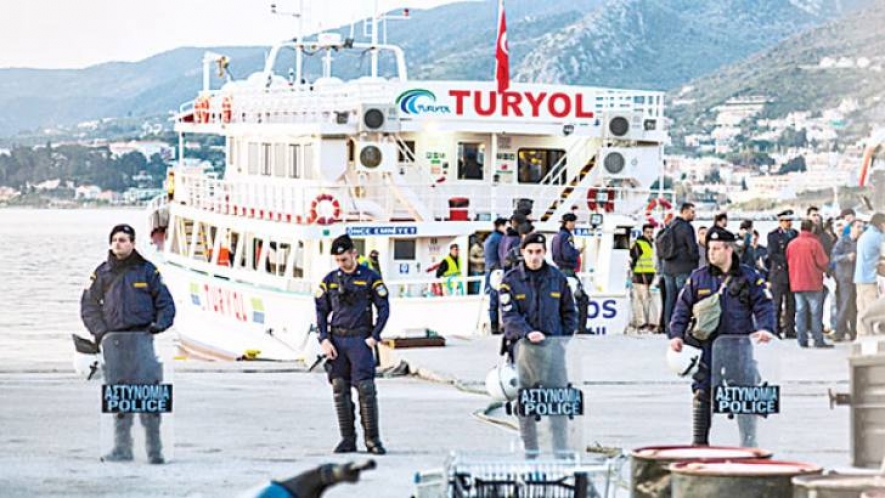The boats contained mostly Pakistani, Bangladeshi, Moroccan and Sri Lankan men, as well as two Syrians who returned voluntarily.
Migrants at the Moria detention centre on the island were woken by police at 4am local time and loaded onto buses at around 06:00 to be taken to the port of Mytilene.
Escorted by large numbers of riot police, they were transferred onto two Turkish passenger ferries which set off around an hour later. Over 700 police officers were involved in this morning's operation, including riot police units from France and Portugal.
As the ferries were leaving, 58 new arrivals from Pakistan and Bangladesh were picked up off the coast of Lesbos and taken ashore.
Under the new agreement between the EU and Turkey, all irregular migrants to arrive in Greece are held at detention centres. Those who do not claim asylum will be automatically returned to Turkey.
Greek officials have said that yesterday's returns involved only people who had not requested asylum.
But 21-year-old Shamshaid Jutt, a Pakistani national recently arrived in Moria, told MEE that Pakistanis had not been informed that they would be returned to Turkey if they did not claim asylum, and had been prevented from doing so. "When they went to ask for asylum [before the new EU deal] they were turned away," Jutt said. "So when the police said to apply for asylum they didn't believe them. They thought it was a trick to deport them quicker."
Jutt said that large numbers of Pakistanis at Moria protested on Sunday, the day before deportations began, and approached police to ask for asylum but were refused.
The EU deal, parts of which first came into effect on 20 March, is designed to stop all irregular migration from Turkey to Europe. All of those who have arrived since 20 March have been held in detention centres on Lesbos, Chios, Leros, Samos and Kos. Each asylum claim is meant to be examined individually.
Described as a one-in-one-out policy, Syrian claims that are rejected or those who do not claim asylum will be immediately returned to Turkey.
For each Syrian national returned to Turkey, one Syrian living in camps in Turkey will be resettled in Europe, with numbers capped at 72,000. The deal aims to stem the most severe refugee crisis Europe has seen since World War II, which has left services in frontline states like Greece and Italy stretched to breaking point.
The deal, though, has been heavily criticised by aid organisations and the UN's refugee agency, UNHCR, which claim that collective deportations such as this are illegal and that Turkey is not a safe destination to return refugees. Groups of activists held a protest at the port during the deportation, chanting "EU, shame on you!" Volunteer rescue vessels also protested in the port, holding a banner above their vessel that read "Ferries for safe passage, not for deportation".
While Monday marked the first deportation to take place under the new deal, Lieutenant General Zacharoula Tsirigoti, Chief of Staff of the Hellenic Police, told reporters that 800 people had been returned from Greece to Turkey since the start of 2016 already.
- Middleeasteye



















